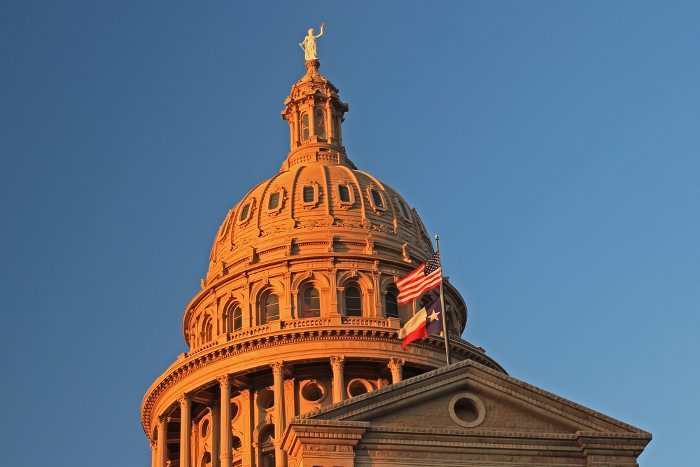Texas Abortion Providers Testify of Struggles in Wake of HB 2
Two Texas abortion providers testified in federal court today about the difficulties they say they've faced keeping their doors open after the passage of Texas' omnibus anti-abortion law, HB 2.

Two Texas abortion providers—one of which has ceased operating entirely in the state, the other of which has closed three of her five Texas facilities—testified in federal court today about the difficulties they say they’ve faced keeping their doors open after the passage of HB 2, the omnibus anti-abortion law that could shutter all but a handful of legal abortion clinics in Texas.
Plaintiff Marilyn Eldridge, who opened the El Paso Reproductive Services clinic with her husband, a minister, just after the Roe v. Wade decision in 1973, said that her group had briefly considered opening nearby in New Mexico after HB 2, though that was no longer an option.
“We are Texans, and we would like to be able to stay in Texas,” she said. Eldridge’s clinic began offering adoption services as part of its operations in the 1980s, and she testified that her clinic had placed more than 800 children for adoption in Texas and Oklahoma since that time.
But Reproductive Services in El Paso shuttered earlier this year when the clinic entered into a dispute with the Texas Department of State Health Services (DSHS), which said that Dr. Pamela Richter, who practiced at Reproductive Services, had lost her admitting privileges at a nearby hospital, as newly required by HB 2. Richter and Reproductive Services maintain that Richter had been granted temporary admitting privileges and never violated HB 2.
The law also bans abortion after 20 weeks, restricts the prescription of medication abortions, and mandates that abortion facilities operate as hospital-like ambulatory surgical centers (ASCs).
Part of this week’s federal court challenge concerns HB 2’s ASC requirement, which will go into effect September 1 barring an injunction from the judge. It is that ASC requirement that is expected to shutter all but six existing abortion-providing ASCs in Texas, and which abortion providers in the state have struggled to meet in advance of the September deadline.
Another plaintiff in the case, Amy Hagstrom Miller, the founder and CEO at Whole Woman’s Health—a group of abortion facilities that once had five locations in Texas—testified that HB 2 has forced her to close all but two of her Texas facilities, a clinic in Fort Worth and an ASC in San Antonio. She said that over the last year, Whole Woman’s conducted an extensive search in hopes of opening an abortion-providing ASC elsewhere in Texas, either by purchasing an existing ASC, building or remodeling an existing facility, or leasing an existing ASC, to no avail.
One barrier, said Hagstrom Miller, was obtaining financing to operate million-dollar facilities that could be shut down in the next legislative session if state lawmakers pass more legislation like HB 2.
“People felt like an investment in Texas was very risky,” said Hagstrom Miller. She said that potential investors asked her, “‘How do you know another law won’t pass that will prevent you from being able to provide abortions at ASCs?'”
Hagstrom Miller testified that her doctors had had trouble obtaining admitting privileges in South Texas, another barrier to her ability to open an ASC in the Rio Grande Valley—ASC regulations require that doctors on staff have admitting privileges, regardless of the nature of the services they provide.
Hospitals in the Valley require a physician with existing admitting privileges to sponsor another physician’s application, said Hagstrom Miller, and Whole Woman’s was able to find only one physician who would act as an application sponsor for an abortion provider. Many, she said, were concerned about potentially violent repercussions from anti-choice protestors who had previously been seen outside the Whole Woman’s clinic in McAllen.
“Some physicians worried about safety,” said Hagstrom Miller, “and worried they would attract attention even by co-signing.”
The hospital at which the potential co-sponsor currently practices declined to provide Whole Woman’s with an application for privileges, though it said its decision had nothing to do with the “clinical competency” of the Whole Woman’s physicians.
Lawyers representing the State of Texas peppered Hagstrom Miller with questions about state-mandated abortion complication reports generated by Whole Woman’s and inspections conducted by DSHS at Whole Woman’s facilities, while Hagstrom Miller said that DSHS inspectors had become tense—”almost to the point of having it feel adversarial”—ever since Whole Woman’s participated in another federal lawsuit, filed in 2013, challenging other provisions of HB 2.
More than half of Texas legal abortion providers have closed since parts of HB 2 went into effect, down to 19 clinics from more than forty in the summer of 2013, before the bill that would become HB 2 was proposed and, despite a 13-hour filibuster from state Sen. Wendy Davis, ultimately passed.
The State of Texas will begin presenting its witnesses Wednesday afternoon, and the trial is expected to conclude by the end of the week, though the case could ultimately make its way all the way to the Supreme Court.
